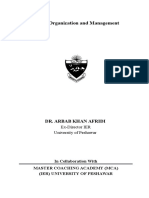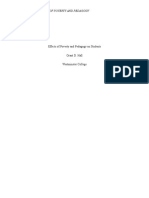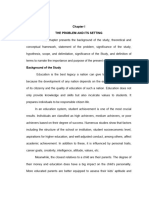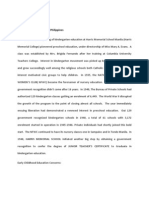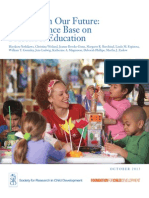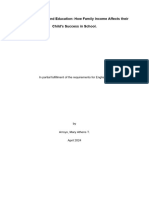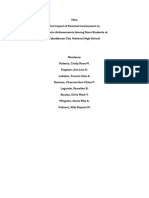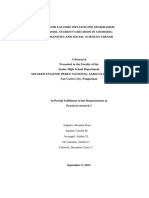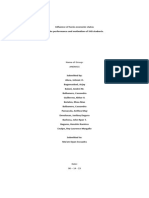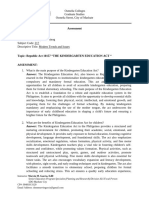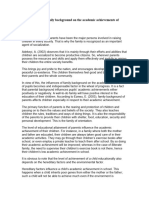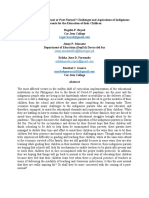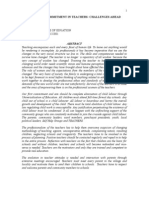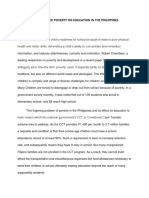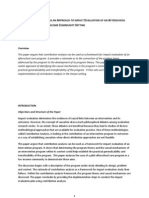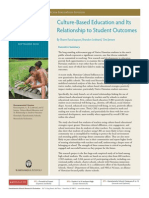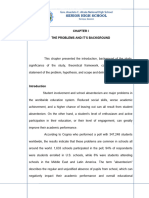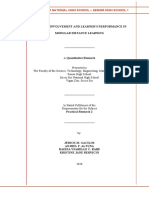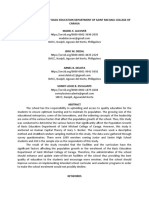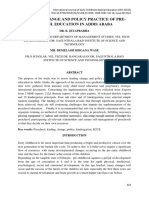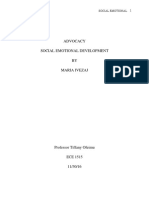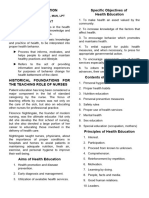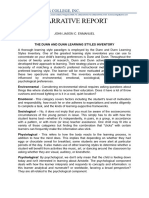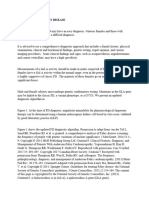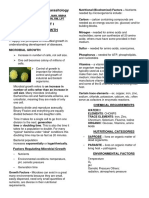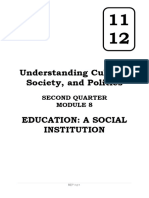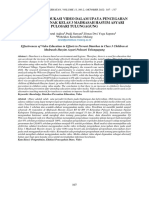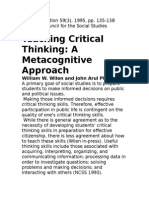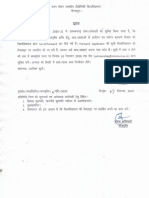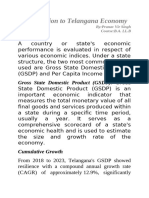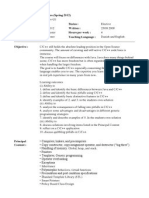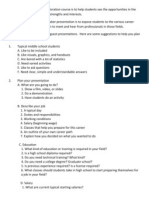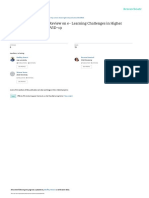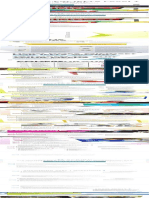NSG 102 - Narrative Report Template
NSG 102 - Narrative Report Template
Uploaded by
jasonenmanuel10Copyright:
Available Formats
NSG 102 - Narrative Report Template
NSG 102 - Narrative Report Template
Uploaded by
jasonenmanuel10Original Title
Copyright
Available Formats
Share this document
Did you find this document useful?
Is this content inappropriate?
Copyright:
Available Formats
NSG 102 - Narrative Report Template
NSG 102 - Narrative Report Template
Uploaded by
jasonenmanuel10Copyright:
Available Formats
ST. ALEXIUS COLLEGE, INC.
Gen. San. Drive, City of Koronadal, South Cotabato, Philippines 09506, Tel.: (083) 228-2019, Fax: (083) 228-4015, Email: st.alexiuscollege@yahoo.com
“Re-imagining Early Childhood Education and
School Readiness for Children and Families of Color
in the Time of COVID-19 and Beyond”
High quality and culturally responsive early childhood education and care (ECEC) for
young children before kindergarten is seen to ensure that all children enter school
ready to learn. ECEC is even more crucial in the context of recovery from the
COVID-19 pandemic and the disproportionate burden of trauma and stress borne by
families of color in disinvested neighborhoods. Remote learning and repeated
disruptions to in-person instruction as protocols shifted during waves of the
pandemic placed an extra strain on families and may have increased educational
disparities in the U.S. Taken together, these challenges have implications for
children’s school readiness due to their impact on opportunities for learning at home
and in the classroom. This paper explores how ECEC programs can be
strengthened to better meet children’s needs, and ways in which future research can
shed light on these important issues. School readiness is typically seen as a
multifaceted combination of fundamental abilities, including social-emotional well-
being, executive functioning, learning styles, and cognitive capabilities, that enables
kids to succeed academically and subsequently flourish in the workforce and
beyond. A sizable and substantial body of research shows that children's academic,
social-emotional, and socioeconomic outcomes are positively impacted by having
excellent school preparation abilities prior to entering kindergarten. High-quality
ECEC is particularly critically important in the aftermath of the COVID-19 epidemic
and given the disproportionate trauma and stress that families of color experience in
underdeveloped areas. We must reevaluate what constitutes high-quality ECEC and
consider what adjustments are required to help families of color to guarantee that all
kids are healthy and prepared to learn when they start kindergarten. The
experiences of children from underinvested areas during the COVID-19 crisis are
discussed in this research, along with the implications for ECEC programs that aim
to improve school preparation. After this worldwide epidemic, we want to inspire a
new research agenda for the area.
What I have learned is that we need to understand what types of supports are most
useful to families and educators to best support children’s growth. Ecocultural theory,
which values the contexts in which families live, is an example of a framework that
could be used to better understand the strengths that families have and the ways in
which they want to be supported. Incorporating practices that uplift and value cultural
and linguistic norms within ECEC environments and curricula allows families to have
voice and agency over the care that their children receive. As this work progresses,
we need to ask what the effect of culturally responsive practices on students’
learning and mental health is. As students feel included and participate in learning
that values their culture, language and beliefs, the benefits for learning and mastery
of skills must be monitored and used to dictate future educational policies.
SUBMITTED BY: JOHN JASON C. ENMANUEL BSN1D
SUBMITTED TO: MA’AM MA RONILEA WAJE, RN, MAN, LPT
ST. ALEXIUS COLLEGE, INC.
Gen. San. Drive, City of Koronadal, South Cotabato, Philippines 09506, Tel.: (083) 228-2019, Fax: (083) 228-4015, Email: st.alexiuscollege@yahoo.com
https://journals.sagepub.com/doi/full/10.1177/08901171221140641c
Kerker, B. D., Rojas, N. M., Dawson-McClure, S., & Gonzalez, C. (2023). Re-imagining early childhood education and school readiness for
children and families of color in the time of COVID-19 and beyond. American Journal of Health Promotion, 37(2), 270-273.
SUBMITTED BY: JOHN JASON C. ENMANUEL BSN1D
SUBMITTED TO: MA’AM MA RONILEA WAJE, RN, MAN, LPT
You might also like
- School Organization and ManagementDocument189 pagesSchool Organization and ManagementMuhammad Nawaz Khan Abbasi91% (58)
- Final-Exam-Modern-Trends NhetDocument8 pagesFinal-Exam-Modern-Trends NhetJeannitte Gelos OnanNo ratings yet
- Edt 305 SDocument12 pagesEdt 305 SBenjamin GrayNo ratings yet
- Original Edited Hope For A Child FormatedDocument72 pagesOriginal Edited Hope For A Child FormatedEsosa AgbontaenNo ratings yet
- Erican ReportDocument34 pagesErican ReportsalumumunduwaboNo ratings yet
- Final - The Paper 10-02-14 2Document12 pagesFinal - The Paper 10-02-14 2api-265448771No ratings yet
- Dayan Research 2 ReviseDocument32 pagesDayan Research 2 ReviseRicky MorilloNo ratings yet
- Aboriginal and Culturally Responsive PedagogiesDocument10 pagesAboriginal and Culturally Responsive Pedagogiesapi-320209389No ratings yet
- Kadewole G&C Parental Involvement On Child Behaviour ProjDocument35 pagesKadewole G&C Parental Involvement On Child Behaviour ProjOmobomi SmartNo ratings yet
- Thesis ProposalDocument12 pagesThesis ProposalMarjorie Grace AlfanteNo ratings yet
- Influence of Family Background On The Educational Development of Secondary School Students in Egor L.G.A. of Edo StateDocument58 pagesInfluence of Family Background On The Educational Development of Secondary School Students in Egor L.G.A. of Edo StateDaniel ObasiNo ratings yet
- Theoretical Framework SamnordanjoshDocument9 pagesTheoretical Framework SamnordanjoshSerLem WellNo ratings yet
- Local LiteratureDocument7 pagesLocal LiteratureTobias AndoyNo ratings yet
- Letter To State Policy MakersDocument3 pagesLetter To State Policy Makersapi-374836054No ratings yet
- Pre K Research ReportDocument24 pagesPre K Research Reportapi-264041036No ratings yet
- Chapter 1 and 2 (Athens)Document7 pagesChapter 1 and 2 (Athens)arroyoathensNo ratings yet
- The Impact of Parental InvolvementDocument10 pagesThe Impact of Parental Involvementengalan.analiza.csuccNo ratings yet
- CHAPTER-1-GROUP-3Document10 pagesCHAPTER-1-GROUP-3ashleyarcangel342No ratings yet
- Quality EducationDocument9 pagesQuality EducationArun Kumar SinghNo ratings yet
- Introduction EngDocument7 pagesIntroduction EngOga TatsumiNo ratings yet
- 1Document11 pages1Dray Cyzzer CatiponNo ratings yet
- Influence of Family Background On The AcDocument71 pagesInfluence of Family Background On The AcDavid UdohNo ratings yet
- Effect of Socio-EconomicDocument11 pagesEffect of Socio-Economicmewef19447No ratings yet
- AN INVESTIGATION INTO THE EFFECT OF POOR PARENTING ON THE CHILDREN AND THEIR ACADEMIC PERFORMANCE OF THEIR CHILDREN - A CASE STUDY IN EGOR LOCAL GOVERNMENT AREA OF EDO STATE - ProjectClueDocument10 pagesAN INVESTIGATION INTO THE EFFECT OF POOR PARENTING ON THE CHILDREN AND THEIR ACADEMIC PERFORMANCE OF THEIR CHILDREN - A CASE STUDY IN EGOR LOCAL GOVERNMENT AREA OF EDO STATE - ProjectCluecollins nzeribeNo ratings yet
- The Level of Child-Friendliness in Sudlon Elementary SchoolDocument13 pagesThe Level of Child-Friendliness in Sudlon Elementary SchoolKrizna Dingding DotillosNo ratings yet
- Practical Research Final 20192020Document60 pagesPractical Research Final 20192020Lyka FigerNo ratings yet
- Assessment - RA-10157-Kindergarten-Education-Act (SHEIDEN MAY R. DALINOG)Document8 pagesAssessment - RA-10157-Kindergarten-Education-Act (SHEIDEN MAY R. DALINOG)paulromanoroyoNo ratings yet
- Cero Group 2 Research Chapter 12.docx1Document15 pagesCero Group 2 Research Chapter 12.docx1joyfullaluna448No ratings yet
- UGC Approved Sr. No.49366, NOV-DEC 2017, VOL-4/37: Scholarly Research Journal For Interdisciplinary StudiesDocument10 pagesUGC Approved Sr. No.49366, NOV-DEC 2017, VOL-4/37: Scholarly Research Journal For Interdisciplinary StudiesAnonymous CwJeBCAXpNo ratings yet
- Family BackgroundDocument10 pagesFamily BackgroundogNo ratings yet
- Draft Paper Bracing For The New Normal or PostDocument20 pagesDraft Paper Bracing For The New Normal or PostErikka JuneNo ratings yet
- Professional Commitment in TeachersDocument7 pagesProfessional Commitment in TeachersJoy Kirt100% (1)
- Parental Capacity and Engagement For Home-Based Learning Amidst PandemicDocument40 pagesParental Capacity and Engagement For Home-Based Learning Amidst PandemicGrace PadigosNo ratings yet
- Final 5Document9 pagesFinal 5Glece Mae Prangos100% (2)
- Contribution Analysis As An Approach To Impact Evaluation of An Afterschool Care Program in Low-Income Community SettingDocument19 pagesContribution Analysis As An Approach To Impact Evaluation of An Afterschool Care Program in Low-Income Community SettingRoy PonceNo ratings yet
- Social Exclusion and Inclusion of WomenDocument10 pagesSocial Exclusion and Inclusion of WomenleoniNo ratings yet
- CBE Relationship To Student OutcomesDocument30 pagesCBE Relationship To Student OutcomesEde SzaboNo ratings yet
- Gomez Research. Edited 2.0Document26 pagesGomez Research. Edited 2.0Joanne Mae LuceroNo ratings yet
- Week 3Document3 pagesWeek 3Rexson TagubaNo ratings yet
- Enhancing School Based Prevention and YoDocument9 pagesEnhancing School Based Prevention and YoYoussouf ALAONo ratings yet
- Final CHAPTER I - VgroupDocument49 pagesFinal CHAPTER I - VgroupBernadette BacayNo ratings yet
- Parental Involvement and Learner'S Performance in Modular Distance LearningDocument15 pagesParental Involvement and Learner'S Performance in Modular Distance LearningRuben Medina Salvador100% (1)
- CHAPTER ONE Education ProjectDocument6 pagesCHAPTER ONE Education ProjectJoseph MuhoroNo ratings yet
- School and Community Intervention Plan 0Document13 pagesSchool and Community Intervention Plan 0api-312386916No ratings yet
- Thesis Outline Kapusan Final Na TalagaDocument24 pagesThesis Outline Kapusan Final Na TalagaMakaldsaMacolJr.100% (1)
- Population Growth of Basic Education Department of Saint Michael College of Caraga Madel E. AlcoverDocument15 pagesPopulation Growth of Basic Education Department of Saint Michael College of Caraga Madel E. AlcoverSonny EscalanteNo ratings yet
- Grou3 PeridotDocument22 pagesGrou3 PeridotarlenemarieamuraoNo ratings yet
- Oromiya School Classification Framework NewDocument16 pagesOromiya School Classification Framework Newgadaabilal7No ratings yet
- New Society National Highschool: Apopong District Division of City SchoolsDocument6 pagesNew Society National Highschool: Apopong District Division of City Schoolsjasondelrosario601No ratings yet
- Research EditDocument25 pagesResearch EditLemuel RamirezNo ratings yet
- Advocacy - Social Emotional DevDocument12 pagesAdvocacy - Social Emotional Devapi-349448402No ratings yet
- School and Community - Written ReportDocument3 pagesSchool and Community - Written Reportdave_monsantoNo ratings yet
- TPS Statement On School Reopening 7-6-2020Document1 pageTPS Statement On School Reopening 7-6-2020Ivan Herrera100% (1)
- 2 - ApawonDocument29 pages2 - ApawonRiza Mhae RojoNo ratings yet
- Socio-Economic Profile of Parents and Academic Performance of Pupils in The Normal Learning ApproachDocument90 pagesSocio-Economic Profile of Parents and Academic Performance of Pupils in The Normal Learning Approachmaricel catorceNo ratings yet
- Chapter 2 DraftDocument12 pagesChapter 2 Draftdanaya fabregas50% (2)
- Children Should Not Be SilencedDocument6 pagesChildren Should Not Be SilencedRaftorNo ratings yet
- Viscaya ARDocument8 pagesViscaya ARFierryl MenisNo ratings yet
- Gifted Adolescents: The Practical Strategies Series in Gifted EducationFrom EverandGifted Adolescents: The Practical Strategies Series in Gifted EducationNo ratings yet
- Ready for Kindergarten: A Tool Kit for Supporting Children and FamiliesFrom EverandReady for Kindergarten: A Tool Kit for Supporting Children and FamiliesNo ratings yet
- Transformational Teaching: The Key <Br>To Authentic <Br>School ImprovementFrom EverandTransformational Teaching: The Key <Br>To Authentic <Br>School ImprovementNo ratings yet
- NSG 102 Lec ReviewerDocument14 pagesNSG 102 Lec Reviewerjasonenmanuel10No ratings yet
- NSG 102 - Enmanuel Narrative ReportDocument3 pagesNSG 102 - Enmanuel Narrative Reportjasonenmanuel10No ratings yet
- Diagnosis of FDDocument2 pagesDiagnosis of FDjasonenmanuel10No ratings yet
- MC3 MICROBIAL GROWTH - DownloadableDocument6 pagesMC3 MICROBIAL GROWTH - Downloadablejasonenmanuel10No ratings yet
- UCSP Second Quarter M08Document19 pagesUCSP Second Quarter M08Chris Michole Tabura AbabaNo ratings yet
- Human Resource Development Literature ReviewDocument7 pagesHuman Resource Development Literature Reviewgw1gnz6b100% (1)
- Efektivitas Edukasi Video Dalam Upaya Pencegahan Diare Pada Anak Kelas 3 Madrasah Hasyim Asyari Pulosari TulungagungDocument11 pagesEfektivitas Edukasi Video Dalam Upaya Pencegahan Diare Pada Anak Kelas 3 Madrasah Hasyim Asyari Pulosari TulungagungIftida YatiNo ratings yet
- Parentkind ASCL NAHT Guidance Building Effective Home School PartnershipsDocument6 pagesParentkind ASCL NAHT Guidance Building Effective Home School PartnershipsAileen Joy GelvezonNo ratings yet
- Nikita CVDocument4 pagesNikita CV3824 Mane NikitaNo ratings yet
- Detailed Lesson Plan (DLP) Format: Objectives: NowledgeDocument2 pagesDetailed Lesson Plan (DLP) Format: Objectives: NowledgeRed Zye UbayNo ratings yet
- Ar DF Gaitan DTR Ar Jan. 12 2024Document3 pagesAr DF Gaitan DTR Ar Jan. 12 2024Mary Grace Tubal Dela CruzNo ratings yet
- Secondary School Education and Nigeria Policy Reforms 2003-2011Document54 pagesSecondary School Education and Nigeria Policy Reforms 2003-2011Researchteam2014No ratings yet
- Ss Compmon PractitionerDocument16 pagesSs Compmon Practitionerzoulzz0903No ratings yet
- 12213notice 12072020Document48 pages12213notice 12072020Abhishek TripathiNo ratings yet
- Roadmap For Learning PortugueseDocument2 pagesRoadmap For Learning PortuguesekbuestezxepjuujwsnNo ratings yet
- Department of Education: Republic of The PhilippinesDocument7 pagesDepartment of Education: Republic of The PhilippinesAvon RockwellNo ratings yet
- Drashti CertificateDocument8 pagesDrashti CertificateBhavin DabhiNo ratings yet
- Introduction to Telangana Economy Write UpDocument8 pagesIntroduction to Telangana Economy Write UppranavvirsinghNo ratings yet
- What Is School Age Course WorkDocument4 pagesWhat Is School Age Course Workf5dvx95v100% (2)
- Petition To President Neet UgDocument18 pagesPetition To President Neet UgNavneetNo ratings yet
- FS 2 Activity 5Document7 pagesFS 2 Activity 5Mharesa ParagasNo ratings yet
- Full Thesis Elyan Rizky Fix PrintDocument78 pagesFull Thesis Elyan Rizky Fix PrintResiNo ratings yet
- Educational Leadership-Practicum GridDocument2 pagesEducational Leadership-Practicum GridRap AranteNo ratings yet
- j2c Uk (s12)Document2 pagesj2c Uk (s12)Martin JørgnsenNo ratings yet
- Guest Speaker HandoutDocument2 pagesGuest Speaker Handoutapi-166448686No ratings yet
- Activity Sheet For Intervention PlanDocument2 pagesActivity Sheet For Intervention PlanMaria Victoria Forte SalayogNo ratings yet
- Academic Writing Ful Lecturer Weak 1 and 2Document4 pagesAcademic Writing Ful Lecturer Weak 1 and 2Sana KhanNo ratings yet
- ASystematic Literature Reviewone Learning Challengesin Higher Educationduringthe COVID19Document11 pagesASystematic Literature Reviewone Learning Challengesin Higher Educationduringthe COVID19nafeesah lagardienNo ratings yet
- Intelli PaatDocument2 pagesIntelli PaatAjay JoshiNo ratings yet
- Mindset For IELTS Level 1 Student's Book PDF English As A Second or Foreign Language International English Language TestinDocument1 pageMindset For IELTS Level 1 Student's Book PDF English As A Second or Foreign Language International English Language TestinhiNo ratings yet
- Standards-Based Grading - Presentation SlidesDocument30 pagesStandards-Based Grading - Presentation SlidesC HeiszNo ratings yet
- Ge 6: Art AppreciationDocument7 pagesGe 6: Art Appreciationerickson hernanNo ratings yet
- E Max Computer Education ProspectusDocument24 pagesE Max Computer Education ProspectusPratyush AryaNo ratings yet
